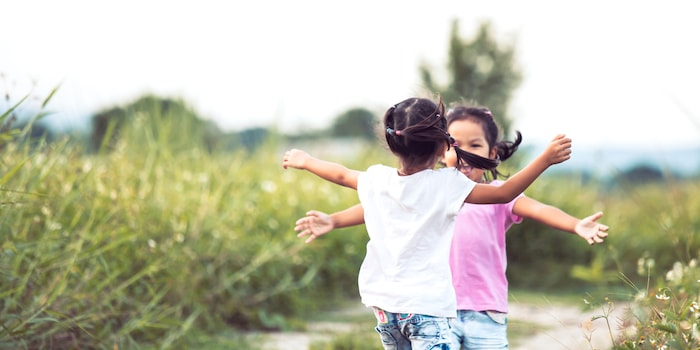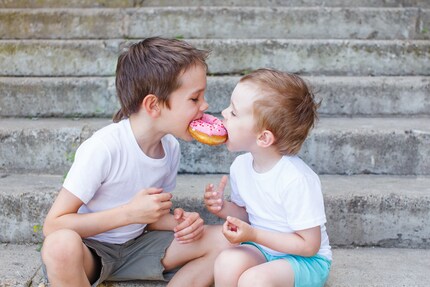
Guide
Defiant and rebellious: why your child’s «difficult phases» are so important
by Patrick Vogt

Even one-year-olds prefer to crawl up to some children rather than others. They make their first friends. How your child can make friends more easily and what you can do if they are excluded.
Some people suit us better than others. This starts very early in life. Even one-year-olds are more attracted to certain children than others: They crawl towards them more often. They smile at them more. They comfort them more often when they are sad.
This leads to the first friendships, some of which last a lifetime.
Friendships are already very important for children. They develop social and cognitive skills with their peers. With friends, children learn to negotiate and argue fairly. "Children play more complex and co-operative games with friends than with non-friends," writes psychologist Robert Siegler in the textbook "Developmental Psychology in Childhood and Adolescence". Whole worlds are invented on a Wednesday afternoon: The blue bedspread becomes the sea. The coffee table is transformed into an underwater cave. Who can take on the role of Nemo? Who will play Dory?
But friends don't just play with each other. They also fight and argue more often than non-friends. At the same time, friends resolve their conflicts more often in a constructive way; they negotiate or give in. According to Siegler, they often find solutions that both sides are happy with.
Children usually look for friends who are similar to them: They are usually around the same age. They are usually the same gender and come from the same cultural background. This also applies to character traits and skills: Sociability, cooperativeness, aggressiveness and even school motivation are often similarly strong or weak among friends.
Children who have good and stable friendships are often rated by their classmates as more competent, more mature and less aggressive. Do more cooperative children simply make friends more easily with other children who are willing to negotiate? Or does the friendship itself lead to the children becoming more co-operative and less involved in fights? It's hard to say which comes first.
When children are small, friendships usually develop as a result of physical proximity. The neighbour's girl becomes their favourite playmate, Leo from nursery their best buddy. For children of this age, friendship means actively doing things together: Playing Gummitwist. Collecting chestnuts. Organising bike races. Sorting Smurfs. Later on, it's also about loyalty, understanding and trust: A friend is someone I share a secret with. A friend is someone I can count on.
Parents are not always happy about who their child makes friends with. But should parents interfere? No, say Julia Dibbern and Nicola Schmidt in their parenting guide "Wild World". If your child brings home behaviour from friends that you don't tolerate, then you should discuss it with them. You can explain to them why you do things differently in the family.

It is precisely because friendships are so important that difficulties and arguments trigger strong emotions. When the person sitting next to you laughs at you. When your child doesn't make friends in a new class straight away. When your best friend suddenly prefers to play with someone else. It's not easy to see your child sad. Nevertheless, parents should not intervene in every case. Some doomsday moods are long forgotten by the next day. Children often find solutions among themselves that adults don't even think of. Dibbern and Schmidt also write that children can resolve many situations on their own. "I managed it on my own" is just as important as "my parents are always there for me".
But just like that: Children need to feel that you are listening to them attentively. They need to know that you are there for them. That they are not alone with their feelings.
But what if your daughter suddenly talks less and less about her classmates? If she regularly complains of stomach aches and headaches? When she no longer sleeps well? If children are systematically marginalised and put down, it is important to keep your eyes and ears open. It is important to talk to your child and look out for these signs. Ask your child if they want help. Talking to the teacher is the first step. The most important thing is for the child to know that their distress is being taken seriously. They need to feel that their home is a safe place. A place where they can talk about anything. A place where they are accepted and loved for who they are.
How easily children make friends depends on various factors: The child's personality and temperament play an important role, as Robert Siegler writes. But that's not all: parents also influence how socially competent their children become with their behaviour. Especially when the children are still very young, mothers and fathers are the "social gatekeepers", so to speak: they decide how often their daughter meets other children. They decide which children their son plays with most often. Depending on the culture, parents encourage their children more or less. They have different expectations of the social skills they want their children to develop: Does my child learn to stand up for his rights himself, or do I interfere? Should I wait until they take the initiative themselves or do I do it for them?
Children who often meet friends and are allowed to play in the neighbourhood are generally more open-minded and social than other children. These children approach others more easily and are more likely to have a regular group of playmates. It is important that parents do not intervene too quickly. Has the neighbour's boy taken Lisa's sand shovel away? If Lisa seeks help on her own initiative, Dad can work with her to find a solution. This can be done without actively interfering. The best thing to do is to first see if Lisa can't get the shovel back all by herself. This is the best way for children to learn to cope in social situations. Friendship then comes naturally.
A passionate journalist and mother of two sons who moved from Zurich to Lisbon with her husband in 2014. Does her writing in cafés and appreciates that life has been treating her well in general. <br><a href="http://uemityoker.wordpress.com/" target="_blank">uemityoker.wordpress.com</a>
Practical solutions for everyday problems with technology, household hacks and much more.
Show all